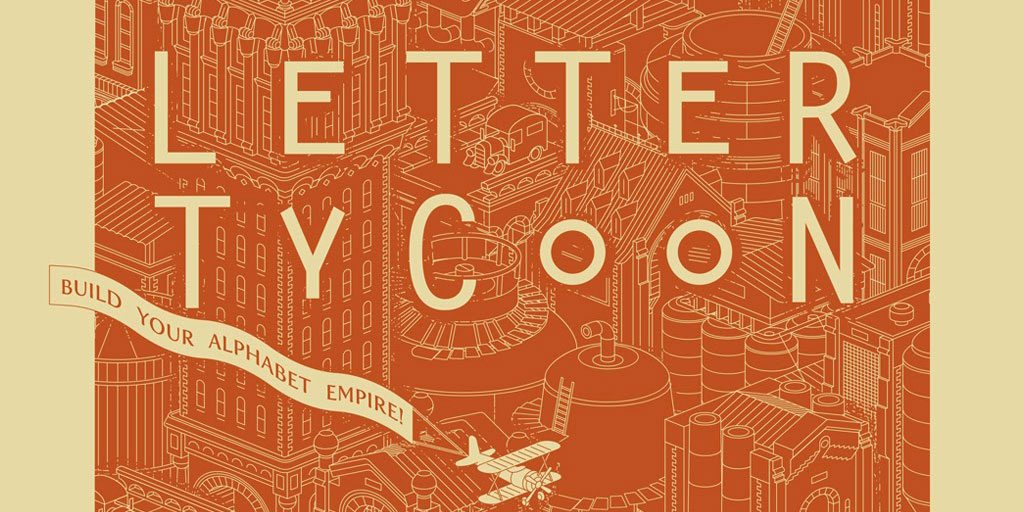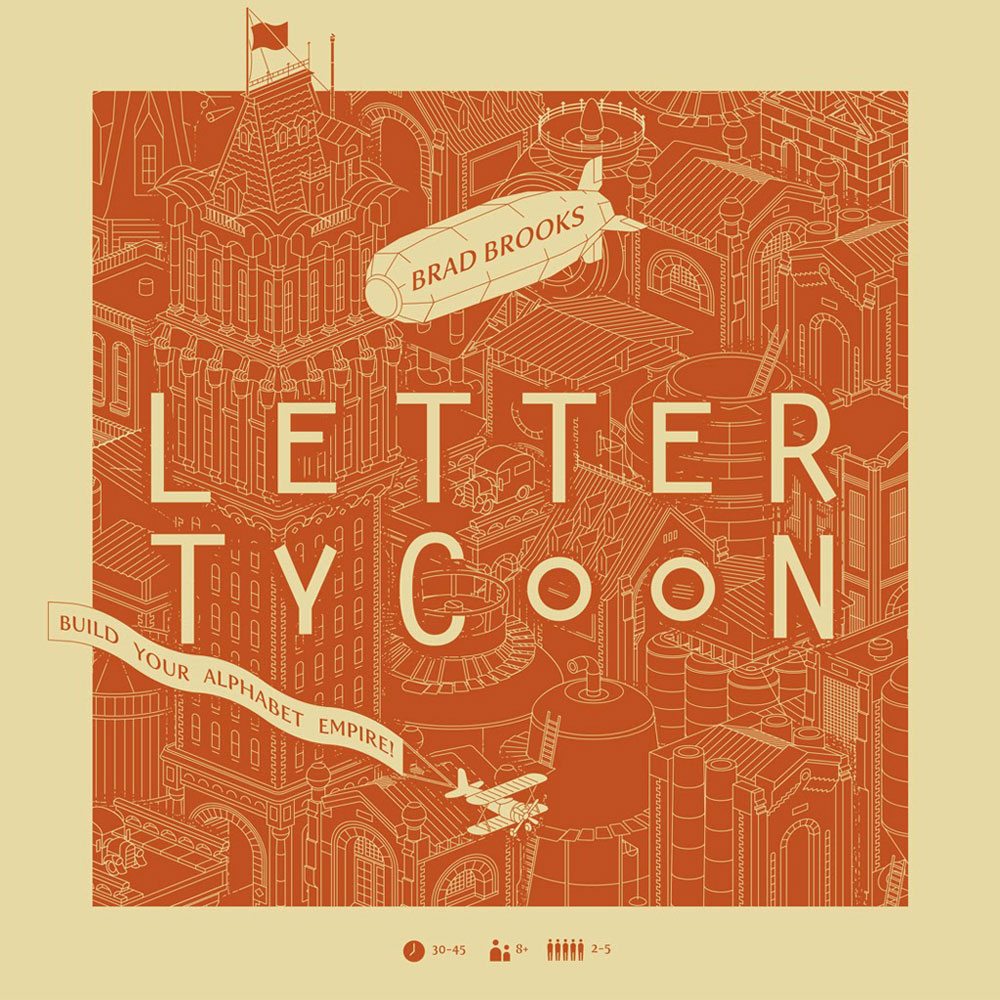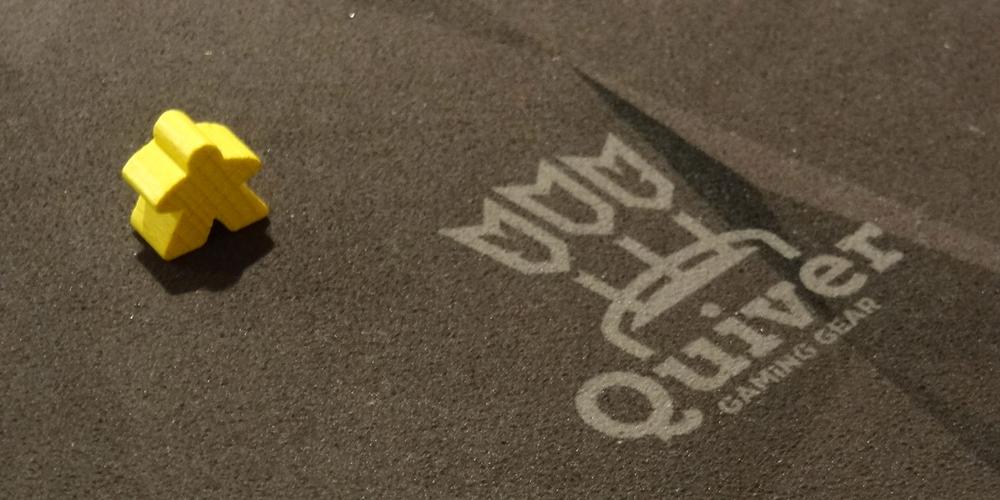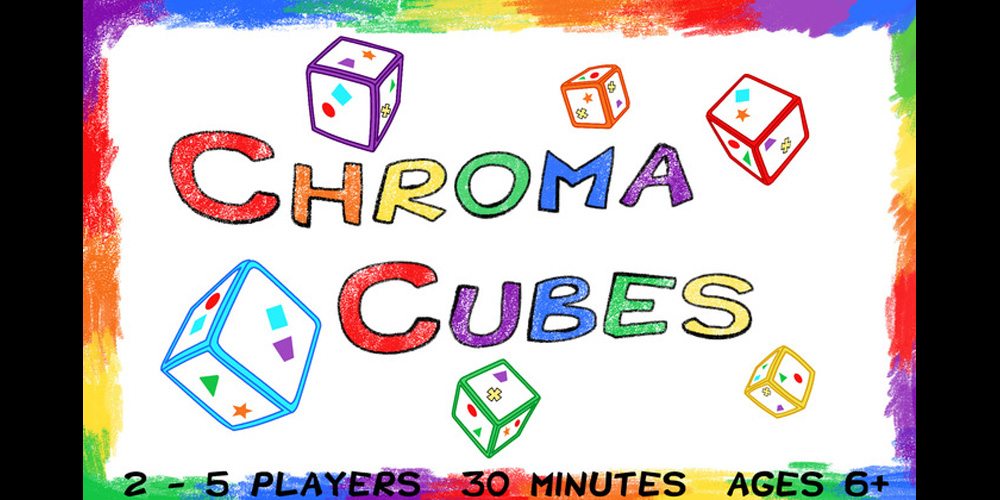So, you wanna build a word, eh? Better put your letter factories to work, kid: the longer the word, the more money you make. Ah, I see you have a “G” in your word. That’s a really nice letter–in fact, I happen to hold the patent on “G,” so I’m gonna collect some royalties now. Go ahead, let’s see who’s the real Letter Tycoon.
At a glance: Letter Tycoon is a game by Brad Brooks for 2 to 5 players, ages 8 and up, and takes about 30-45 minutes to play. It’s priced at $35 and is available directly from Breaking Games and in select retail stores.
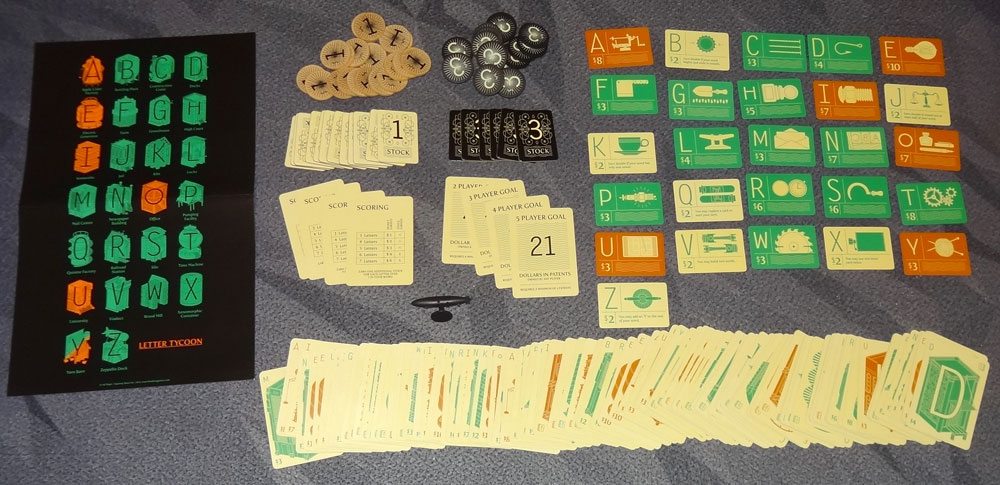
Components:
- 102 Letter Factory cards
- 26 Letter Patent cards
- 35 Coins (in $1 and $3 denominations)
- 18 Stock Certificates (in $1 and $3 denominations)
- 4 Goal cards
- 5 Scoring Reference cards
- 1 Zeppelin start marker
- 1 Letter Factory poster
The components are all very nice. The Zeppelin start marker is a plastic miniature that’s actually fairly large. The coins are actually screenprinted wooden tokens: the $1 coins are natural wood with black paint, and the $3 coins are black with cream paint.
The Letter Factory cards are a linen finish and feel pretty nice, though they’re a little more flexible than some cards I’m used to, and they’re standard-sized cards. The Letter Patent cards are half-sized cards, also linen finish. The Stock Certificates are cardboard tokens.

Each Letter Factory card has a small letter at the top left corner, a large illustration of a building with the letter in the center of the card, the cost of the patent at the bottom left, and a small icon at the top right that shows how many of that letter are in the deck. That icon at the top right is the only thing that struck me as a little weird, because it looks like a fraction. “A” says 1/9 at the top–but the “1” seems totally unnecessary.
Goal cards are used to indicate the victory conditions based on the number of players. The Scoring Reference cards show how much you earn for making a word, and the back side has the letter frequency for the game.
Everything about Letter Tycoon is gorgeous. The illustration and graphic design is by Mackenzie Stuart, and really goes well with the patenting theme. Each letter is represented by a building of some sort (A is for Apple Cider Factory, G is for Greenhouse, etc.) and the associated patent card for that letter has a small illustration that’s somehow related to the building. It took us a while to figure this out, actually. Why does D’s patent have a fishhook on it? Because D is for Docks. The one thing is that the names of the buildings only appear on the poster, not on the cards themselves.
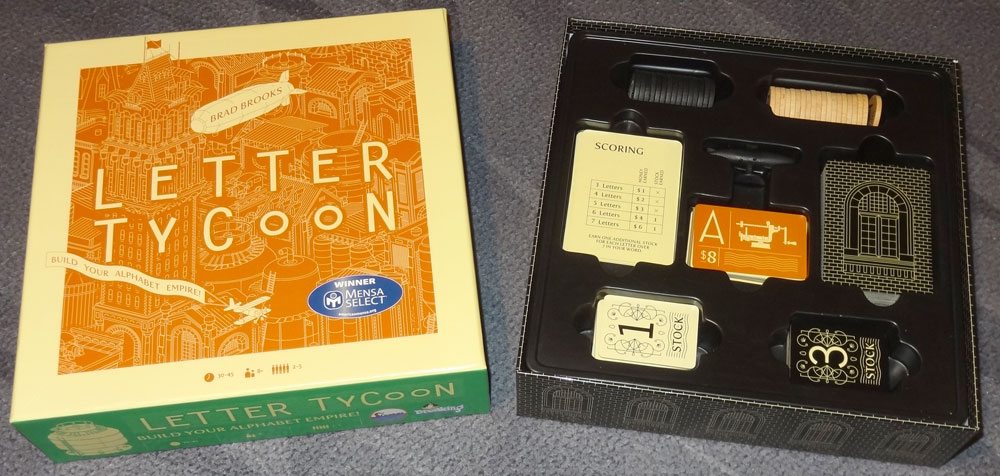
All of the components came pre-punched in this plastic insert that has a spot for everything. While the insert does hold everything nicely, the box is still larger than necessary–it’s a fairly standard square box, but there’s a lot of air in it, as you can tell from the photo.
How to Play
The rules are available as a PDF here.
The goal of the game is to have the highest value of patents, stocks, and cash.
To set up, the Letter Factory cards are shuffled and each player gets 7 cards. 3 cards are turned face-up on the table as the community pool. The Letter Patent cards are all laid out on the table so everyone can see them. The Goal card for the appropriate number of players is also set on the table. The starting player is given the Zeppelin token.
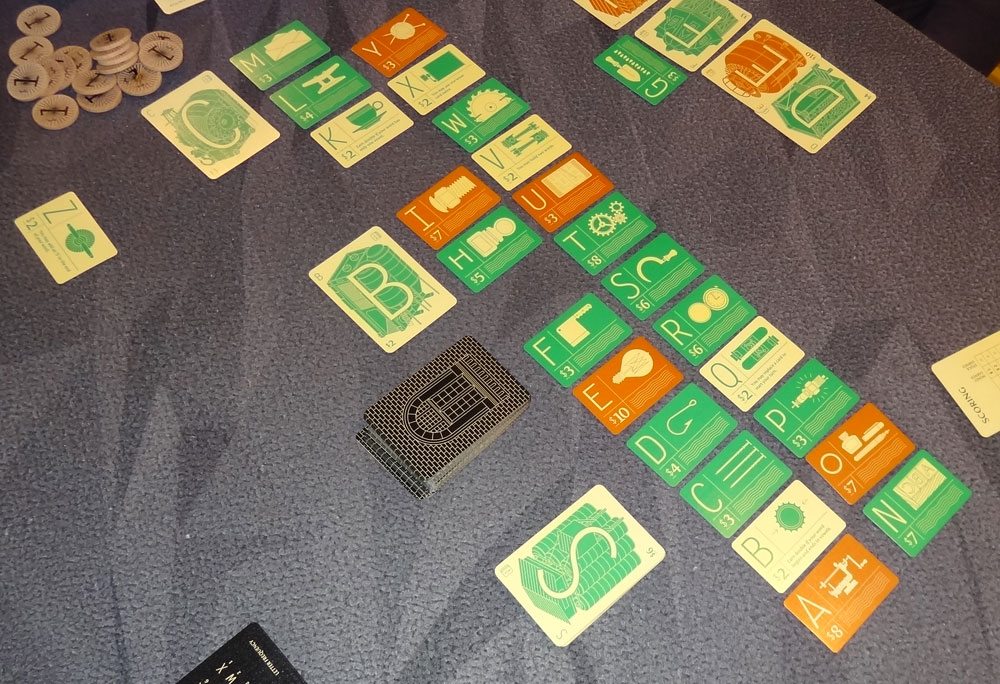
On your turn, you may either make a word, or refresh your hand by discarding any number of cards and drawing back up to 7 cards.
You may make a word with the cards in your hand and the cards in the community pool. You earn cash and stocks based on the total length of the word. Then, if you wish, you may buy one of the available Letter Patents for a letter that you used in your word. You then discard all cards that you used this turn, plus any others you wish to discard from your hand. Draw back up to 7 cards, and refill the community pool to 3 cards.

Stocks cannot be spent–they just add to your score at the end of the game. If you own a Letter Patent, then any time another player uses that letter in a word, you get $1 from the bank. (You don’t earn money for using your own patented letters.) Some of the Letter Patents–those for the less common letters–also award you with bonus abilities. For instance, the Z patent allows you to add “S” to the end of your word. The V patent lets you spell two words on your turn, scored separately.
When any player has reached the Goal value in Letter Patents, the round is finished (so all players have the same number of turns). Your score is the total of your patents, stocks, and cash–highest score wins! Tie goes the highest value in patents.
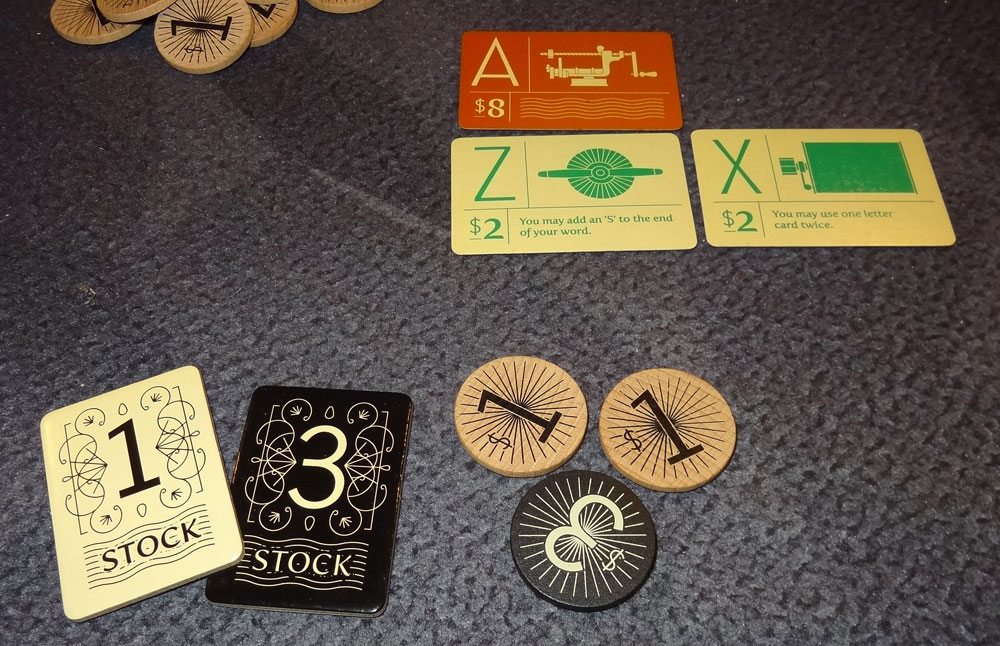
The Verdict
There are a plethora of word-making games out there, each one with its own spin. The key to Letter Tycoon is getting the most valuable patents–both for scoring at the end of the game, and to make money every time that letter gets used. It’s a pretty fascinating mechanic, playing a patent troll. As soon as you buy a letter, everyone wants to use that letter as little as possible. At least it’s not like real patent litigation, where the settlement or licensing fees come out of your own pocket. We thought about adding a rule that if you didn’t claim your royalties before the next player started a turn, then you forfeit them. Hey, it’s your responsibility to protect your own patents, right?
As in business, in Letter Tycoon you have to spend money to make money. Getting patents for common letters will earn you a lot of cash, particularly if you can save up enough for a vowel. I like that the patents for the less common letters are not only cheaper but also give you a bonus of some sort–it can make it worth buying a “Z” patent even though other players may not use a “Z” for quite some time.
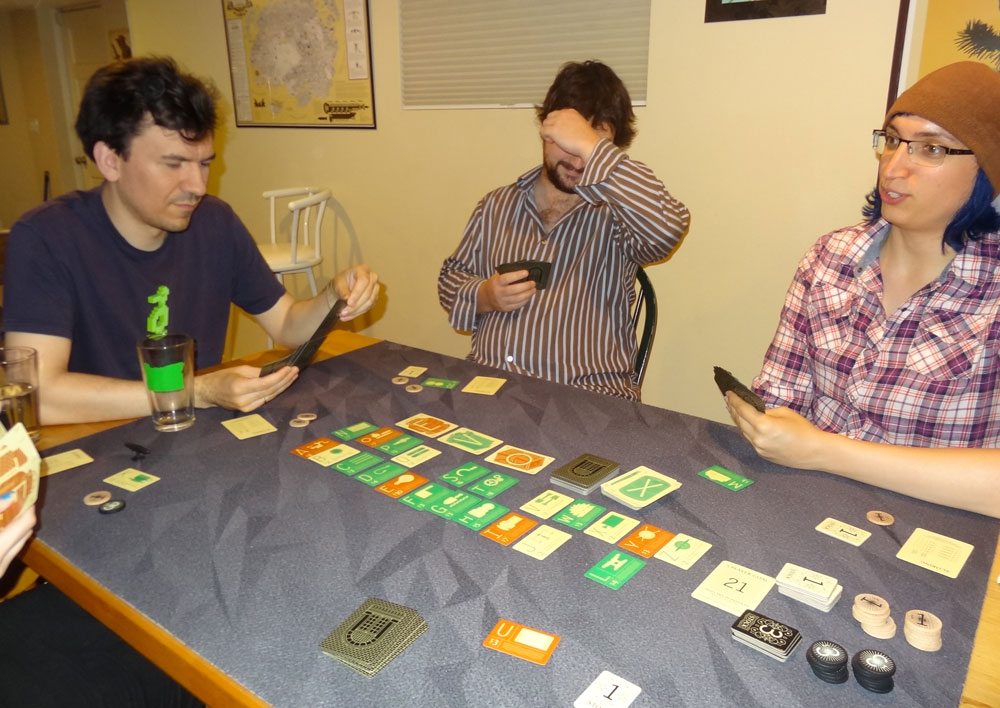
After a lot of patents have been purchased, it becomes harder and harder to spell a word that won’t earn somebody else money–and you have to decide when it’s worth it to spell a longer word or when it’s worth it to earn less yourself so that an opponent doesn’t earn a pile of royalties. Depending on the length of your word and the patents somebody holds, it’s even possible for them to make more than you on your word.
The available patents also can affect what word you spell because you can only buy a patent for a letter you used this turn. So it’s doubly important to use letters whose patents are still in the supply–you won’t give anyone royalties and you’ll have the opportunity to purchase them. And, of course, you’ll have to decide each turn whether to purchase a patent right away, or whether to build up cash to buy that $10 “E.”
Not everyone liked the community pool. It gives you three additional letters to use in your word, sure, but you never know if somebody is going to use any of them before your turn comes up. What it means, effectively, is that you can’t finalize your word until it’s actually your turn. If you happen to have a 7-letter word in your hand already, that’s great, but there are a lot of times when some additional letters would be very helpful or even necessary. It felt like having the community cards slowed down the game to some extent, and we debated whether it would make sense just to allow everyone to draw more cards instead. The nice thing about the community cards, though, is that it can help with buying patents: if I notice there are a couple of the same letter in community cards and I’m able to buy a patent for it, then I know that eventually somebody will probably use those letters, earning me royalties.
Overall, I’ve really enjoyed Letter Tycoon. It’s a sharp-looking word game, and I like the layer of strategy that having the patents adds. If you’re a fan of word games, Letter Tycoon is definitely worth adding to your lexicon.
Disclosure: I received a review copy of this game.
